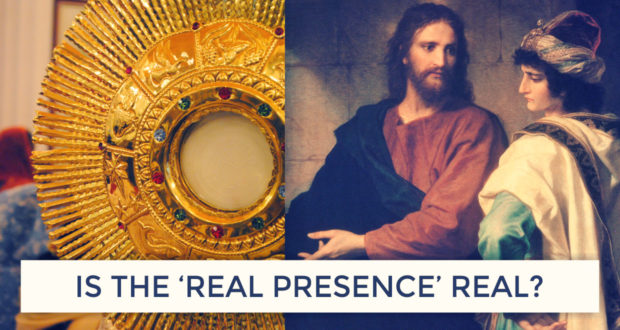Fictional Dialogue on Transubstantiation
“Doubting” THOMAS [Protestant]: Hey Joe, how can you Catholics believe that the communion wafer actually turns into the Body and Blood of Christ? Do you expect me to accept that?!
JOE [Catholic]: Because in this case, we are the ones who insist on taking the Bible literally. There is much to suggest the miracle we call transubstantiation. For instance, in John 6:51-56, Jesus states five times that “he who eats my flesh and drinks my blood has eternal life” (Jn 6:54; RSV).
THOMAS : That’s obviously symbolism. Jesus usually taught in parables, and He was often misunderstood, like when He said He would rebuild the Temple in three days (Jn 2:18-21).
JOE : Yes, Thomas, but when the Jews (Jn 6:52) and “many of his disciples” (Jn 6:60) objected, Christ merely restated His words forcefully, rather than assure them He wasn’t speaking literally. He was so firm that many left Him (Jn 6:66). He could have easily prevented their confusion.
THOMAS : One exception to the rule doesn’t prove much.
JOE : It’s not an exception. Jesus took great care to correct wrong impressions, when His hearers were open to receiving His words, such as in John 3:1-15, where Nicodemus didn’t comprehend being “born again,” and Matthew 16:5-12, concerning the “leaven of the Pharisees.”
THOMAS : Hmmm. That’s interesting. Do you know of any other examples where Jesus simply repeated an unpopular teaching?
JOE : Sure, like when Jesus talked about His power to forgive sins (Mt 9:2-7), and His eternal existence (Jn 8:56-58). These are cases where He was talking with hostile listeners such as the Pharisees. Since Jesus knew everything, He knew who would reject His words and who would accept them, and acted accordingly. In John 6, then, it looks like the hearers understood full well what He was saying, but didn’t want to accept it, rather than accepting it but understanding that it was symbolic, as many Protestants maintain.
THOMAS : But why should we just accept something without explanation? Isn’t that expecting too much? Why does the Catholic Church make people believe stuff without giving the reasons for them — often things that seem unreasonable in the first place? I don’t want to be gullible.
JOE : You and many other former Catholics may have gotten some bad and ineffective teaching along the way, but this doesn’t prove that the doctrines of the Catholic Church are false. Reasons have been given for all its doctrines, and theologians have worked on and developed these for centuries. With a little effort, you could have found answers. I’ve talked to many people like you who have never read a single book defending Catholicism. But on the other hand reason can only go so far and there is a thing called faith, too. You need to stop doubting, Thomas [Jn 20:24-31]! Jesus performed enough miracles to be trusted for the difficult things He said, such as “This is my body” (Lk 22:19). The Real Presence is no less believable than the Resurrection, Virgin Birth, walking on water, or the Second Coming: all supernatural physical events.
THOMAS : You make some good points, but what about Paul? He doesn’t talk about trans . . sub . . . What is it?
JOE : Transubstantiation. That’s a 50 cent word meaning “change of substance.” I have to disagree about St. Paul. He sure seems to refer to some sort of Real Presence in 1 Corinthians 10:16 (“participation in the body of Christ”) and 11:27, where he states that those taking communion “in an unworthy manner will be guilty of profaning the body and blood of the Lord.” Is a man guilty of someone’s “body and blood” if he desecrates a photograph (symbol) of them? Non-Lutheran and non-Anglican Protestants in the 16th century were the first Christian groups of any historical and lasting importance to think differently. Martin Luther himself believed in the Real Presence and regarded others who differed with him on this as “out of the Church” altogether.
THOMAS : But a piece of bread is really Christ!? What sense does that make? Isn’t that going a little bit too far?!
JOE : We believe the substance of the bread has changed, while the appearance (“accidents”) of bread remains. There are some partial parallels: That glass in your hand has H2O in two forms or accidents: ice and water, but both have the same substance. The food we’re eating changes both substance and accidents when it is digested. Transubstantiation is hard to imagine, I grant, but nothing is impossible with God.
THOMAS : Well, I guess I do need to read and study this some more. I’m not convinced of it at all, but if so many Christians, as you say, have believed this way, I can’t simply dismiss it as nonsense. That would be kind of arrogant. I’ll have to think about it. You’ve really challenged me. See ya later, Joe!
Monstrance Image CC Simon Chumkat

 Seton Magazine Catholic Homeschool Articles, Advice & Resources
Seton Magazine Catholic Homeschool Articles, Advice & Resources

